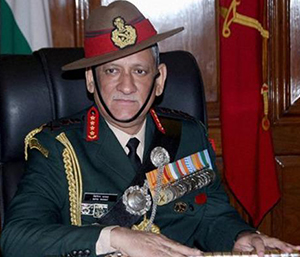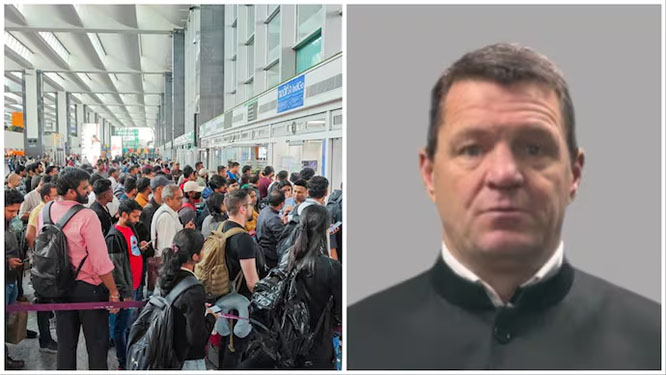New Delhi, Jan 15: Army Chief Gen Bipin Rawat today said jawans who take to social media to express their complaints could be punished as their act lowers the morale of those guarding the frontiers of the country.

He also said that despite Pakistan's continuous engagement in proxy war against India, "we want to restore peace on the Line of Control". "But we will not hesitate from giving a fitting reply in case of any ceasefire violation," he asserted.
The Army Chief was addressing the Army Day celebrations here, where he awarded gallantry medals to soldiers who showed extraordinary courage while performing duty.
"If any jawan has any grievance, he has been provided with the proper forum to resolve his issue and maintain a balance. If you are not satisfied with the action, then you can contact me directly," Gen Rawat said.
"Aapne jo karwai ki hai aap iske liye apradhjanak hain, aur saza ke haqdaar ho sakte hain (You are violating rules by your act and you could be punished for that)," he said, referring to instances of jawans taking to social media to air their grievances.
"It (airing of grievances on social media) has (negative) impact on the brave jawans who are serving the country along the border," he said.
On the terror menace, he said that in the last few months of 2016, the security situation in Jammu and Kashmir turned very volatile.
"Be it LAC (Line of Actual Control) or LOC (Line of Control), we will take the appropriate action and our soldiers are doing a commendable job at all fronts," he said.
"On the northern front, India wants peace with China. Both sides are adopting confidence building measures (CBMs) so that tension on the border can be reduced. Despite transgressions on LAC, the armies on both sides have improved on mutual coordination," said Gen Rawat.
"I understand that our competitors are aware of our strengths. While being always ready, our policy is to take action at any place and any time. Our efforts to restore peace on the border must not be viewed as our weakness," he said, while warning those who try disrupt peace through terror activities.
The Army Chief inspected the parade at Field Marshal Cariappa Parade Ground here. Marching contingents from six different regiments and display of missile systems such as Brahmos and Akash were among the highlights of the event.
What stole the show was combat demonstration by different schools of infantry which fired medium-range guns, besides battle tanks rolling past the parade.
"87 defence attaches from 35 countries including the US, Japan, Russia, China, Israel and African nations marked their presence at the event," said a senior army official.
The function came to an end with Indian army's 'Janbaaz' motorcycle daredevils performing stunts and a team of paramotorists displaying tricolour and flags of the three defence forces.
Meanwhile, the South Western Command celebrated Army Day by paying tributes to the martyrs at a colourful ceremony in Jaipur.
The area around the Amar Jawan Jyoti reverberated with patriotic military tunes and a display by drummers mesmerised all present for the occasion.
Helicopter display and dances like Bhangra and Naga dances as also a dog show evoked great interest and enthusiasm amongst the gathering.
Wreaths were laid by state industry minister Rajpal Singh Shekhwat and Lt Gen Saranjeet Singh, YSM, Chief of Staff, South Western Command.
In his address, Lt Gen Singh conveyed his greetings to all serving and retired defence personnel of the South Western Command.
He exhorted all personnel to be ready to face the multi-faceted challenges of the modern day battlefield in order to reach the pinnacle of glory.
The 69th Army Day was also celebrated in Mathura where Lieutenant General Ranbir Singh, General Officer Commanding Strike 1 Corps, laid the wreath at the war memorial.
Army Day is celebrated every year on January 15 to mark the taking over of command of the Indian Army by the first Indian Commander-in-Chief, Lt Gen (Later Field Marshal) K M Cariappa on this day in 1948.
He took over the reins of the Indian Army from Lt Gen Sir Francis Butcher, the last British Commander-in-Chief.







Comments
What action you are going to take, for supplying low quality food which is given to our jawans.
Add new comment